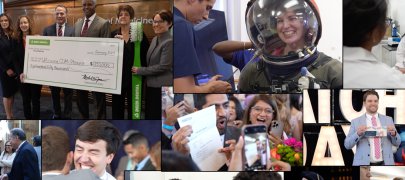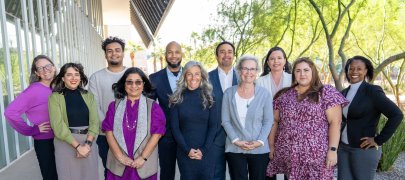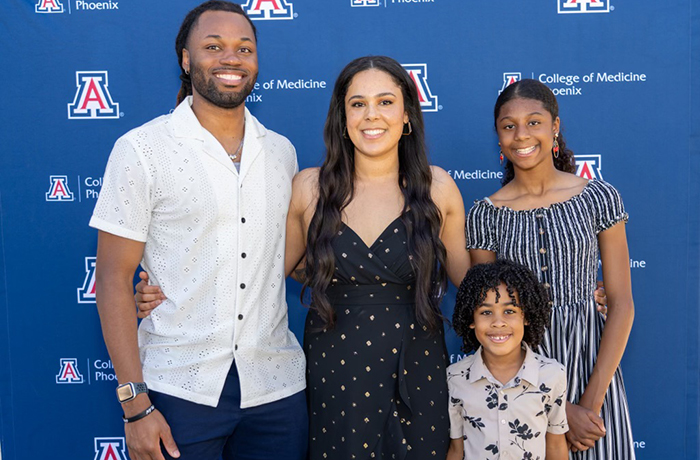
White Coat Profile: Kiera Vaughn

The White Coat Ceremony marks the first time a medical student will don his or her white coat, the defining symbol of a physician. The coat bestows a great honor on each student, and with it comes a responsibility to uphold the trust of every patient they will encounter. The Class of 2028 will receive their white coats on July 19 during a ceremony that begins at 3:30 p.m. in the West Ballroom of the Phoenix Convention Center downtown.
Meet Kiera Vaughn
Originally from Oklahoma, Kiera Vaughn has lived in multiple states throughout her life, including Arizona. In fact, during her adolescence, she moved so many times that she went to three elementary schools, two middle schools and four high schools.
After finishing high school, she chose to attend the University of Central Oklahoma, where she was able to graduate Summa Cum Laude with a bachelor of science in biomedical science. She then returned to Arizona to earn a master of medical studies from the University of Arizona College of Medicine – Phoenix through the Pathway Scholars Program.
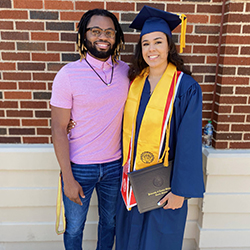
Vaughn became interested in medicine because it allows her to be a part of something meaningful and much bigger than herself. It is one of the few careers whose focus is on caring for others and doing truly everything that one can to help.
Vaughn noted that her biggest supporters are her husband and kids. They have been with her throughout every step of this process and are her reason for everything. They remind Vaughn why she initially chose this path and push her daily to be the best version of herself.
Path toward Medicine
What was the spark that led you to become a physician?
Like most people, I spent a large portion of my life not really knowing what I wanted to do when I grew up. As the first born to a teen mom who earned a GED in place of a high school diploma, my main goal had initially just been to graduate high school. After accomplishing that goal, I didn’t have a clear direction for my life, but I knew that I wanted to experience college, so I auditioned for and earned a Vocal Performance position within University of Central Oklahoma’s College of Music.
Despite my love for all things music, it did not go as smoothly as I had hoped. Less than one month into that degree I learned that I too would become a teen mom and failed out of all my classes. At that time, I thought that I was failing at life, but it ended up being my biggest blessing.
Taking an unplanned break from school forced me to take the time that I needed to grow and decide what I wanted for my life; and having a baby introduced me to the world of medicine. As someone who is dependent on Native American Health Care services, which are often hard to access, I rarely ever used to go to the doctor. However, as a young mom I was able to have regularly scheduled visits with an OB/GYN and then a pediatrician. Both experiences sparked a curiosity in me, which caused me to begin researching medicine as a career. The more that I learned and experienced, the more that I just knew that this was the career for me.
Did you do any volunteering in health fields prior to medical school?
Prior to medical school, I volunteered at two free clinics, Manos Juntos and Lighthouse. Both experiences gave me the opportunity to interact directly with patients that had immediate needs and no access to insurance.
I also volunteered at Mercy Hospital on the Labor and Delivery floor, as well as within the NICU. By getting involved, I was able to be of service to new mothers after delivery. In that role, I was fortunate enough to be trusted with assisting nurses with taking care of premature infants in the NICU.
Other health related volunteer experiences that I did were with the City Rescue Mission, Habitat for Humanity and the Regional Food Bank of Oklahoma. These opportunities focused mainly on social determinants of health such — as homelessness and food insecurity.
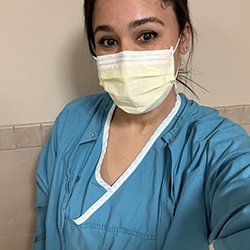
In addition to volunteering, I also worked for three pulmonologists/intensivists as a scribe for two years. This exposure furthered my passion for medicine because it allowed me to meet several amazing people with a true compassion for others and love for medicine.
The College of Medicine – Phoenix
Why did you choose the College of Medicine – Phoenix?
Choosing University of Arizona College of Medicine – Phoenix was probably one of the best choices that I could have made because this school does so many things right. Their values of inclusion, collaboration and community are echoed throughout the school via classroom activities, assigned readings, clubs, interest groups, conferences and more.
All the deans and professors are knowledgeable, approachable and sincere. There are so many resources and people that you can reach out to for help with just about anything. Everything is carefully curated to create an environment that encourages students at all different stages to help one another. I genuinely feel that I am being set up for success.
What excites you most about beginning medical school?
I’m not sure that I can pick just one thing because there are so many things that make me excited about being in medical school. One of the things that I am looking forward to is the opportunity to further explore medicine as a whole and find my niche. I am also interested in learning more about both rural medicine and global health. Mainly, I am just excited for all the knowledge I will obtain and lifelong friendships I will gain over the next few years.
Significance of the White Coat
What does the white coat mean to you?
To me the white coat symbolizes a promise to my future patients to be worthy of their trust. I realize that education is a privilege, and I don’t take that responsibility lightly. I care so much about becoming the best physician that I can, so that when hard decisions must be made, I know that I am making the right one. It will take a lot to earn this coat, but I am ready to do what it takes.
About the College
Founded in 2007, the University of Arizona College of Medicine – Phoenix inspires and trains exemplary physicians, scientists and leaders to optimize health and health care in Arizona and beyond. By cultivating collaborative research locally and globally, the college accelerates discovery in a number of critical areas — including cancer, stroke, traumatic brain injury and cardiovascular disease. Championed as a student-centric campus, the college has graduated more than 900 physicians, all of whom received exceptional training from nine clinical partners and more than 2,700 diverse faculty members. As the anchor to the Phoenix Bioscience Core, which is projected to have an economic impact of $3.1 billion by 2025, the college prides itself on engaging with the community, fostering education, inclusion, access and advocacy.

